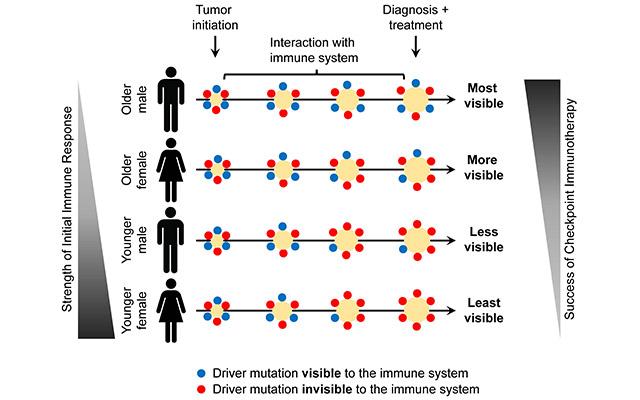Tumor cells in younger and female patients accumulate cancer-causing mutations that are more poorly presented to the immune system, better enabling tumors to escape detection and clearance

Credit: UC San Diego Health Sciences
Cancer immunotherapy — empowering a patient’s own immune system to clear away tumors on its own — holds great promise for some patients. But for other patients, immunotherapy just doesn’t work.
Researchers at University of California San Diego School of Medicine have found evidence that helps explain why patients who are young and/or female have especially low response rates to some types of cancer immunotherapy.
Their findings suggest that since the typically robust immune systems of young and female patients are better at getting rid of tumor cells, the cells left behind are not as readily visible to the immune system to begin with, rendering some types of immunotherapy ineffective.
The study is published August 17, 2020, in Nature Communications.
“Now that we know why some patients don’t respond as well to immunotherapy, we can begin developing more informed approaches to treatment decisions — for instance, developing predictive algorithms to determine a person’s likely response before initiating immunotherapies that may have a high probability of not working or working poorly for them,” said senior author Hannah Carter, PhD, associate professor of medicine at UC San Diego School of Medicine.
Cancerous or infected cells wave molecular flags that tell the immune system to clear them away before the problem gets out of control. The flag poles — molecules of the Major Histocompatibility Complexes (MHC) — are displayed at the surface of most cells in the body. MHCs hold up antigen flags — bits of just about everything from inside the cells — and display them to immune cell surveyors that are constantly checking for damaged or infected cells. Since tumor cells carry a lot of mutations, they show up frequently among these flags, allowing the immune system to detect and eliminate them.
But some tumor cells evade the immune system by also throwing up a stop sign molecule that keeps the immune system from recognizing the MHC flags. And here’s where immune checkpoint inhibitors come in: This type of cancer immunotherapy uses antibodies to make the tumor cell once again visible to the patient’s immune system.
So why would a person’s age or sex influence how well immune checkpoint inhibitors work?
Sex and age differences have long been observed when it comes to immune response. For example, females have twice the antibody response to flu vaccines and are far more susceptible to autoimmune diseases. Similarly, human immune systems tend to weaken as we age. But if females and younger people have stronger immune responses in most cases, you might expect cancer immunotherapy to work better for them, not worse.
To get to the bottom of this conundrum, Carter’s team looked at genomic information for nearly 10,000 patients with cancer available from the National Institutes of Health’s The Cancer Genome Atlas, and another 342 patients with other tumor types available from the International Cancer Genome Consortium database and published studies. They found no age or sex-related differences in MHC function.
What they did find was that, compared to older and male patients with cancer, younger and female patients tend to accumulate more cancer-causing genetic mutations of the sort that MHCs can’t present to the immune system as efficiently. Carter said this is likely because robust immune systems of the young and female are better at getting rid of cells displaying well-presented mutant self-antigens, leaving behind tumor cells that rely more heavily on the poorly presented mutations. This selective pressure is known as immuno-editing.
“So if a tumor cell doesn’t present highly visible, mutated self antigens to begin with, checkpoint inhibitor drugs can’t help reveal them to the immune system,” she said.
“This shows an important thing, that the interplay between the cancer genome and the adaptive arm of the immune system is not a static one,” said co-author Maurizio Zanetti, MD, professor of medicine at UC San Diego School of Medicine and head of the Laboratory of Immunology at UC San Diego Moores Cancer Center. “Two simple but important variables, age and sex, influence this interplay. The study also emphasizes the master role of the MHC in dictating the outcome of this interplay, reaffirming its central role in the evolution of disease, cancer included, at the level of the individual and population.”
Carter cautions that their findings for “younger” patients don’t necessarily apply to children since, genetically speaking, pediatric tumors are very different from adult tumors. In addition, she noted that, like most genomics databases, those used in this study contain data primarily from people of Caucasian descent, and more diversity is needed to confirm that the findings can be generalized to all populations.
“Cancer isn’t just one disease, and so the way we treat it can’t be one-size-fits-all,” she said. “All checkpoint inhibitors can do is remove the generic block that tumors put up to hide from the immune system. The more we learn about how interactions between tumors and immune systems might vary, the better positioned we are to tailor treatments to each person’s situation.”
###
Co-authors of the study also include: Andrea Castro, Rachel Marty Pyke, Xinlian Zhang, Wesley Kurt Thompson, Ludmil B. Alexandrov, Maurizio Zanetti, UC San Diego; and Chi-Ping Day, National Institutes of Health.
Disclosure: Co-author Rachel Marty Pyke is an employee and holds stock in Personalis.
Media Contact
Heather Buschman
[email protected]
Related Journal Article
http://dx.




